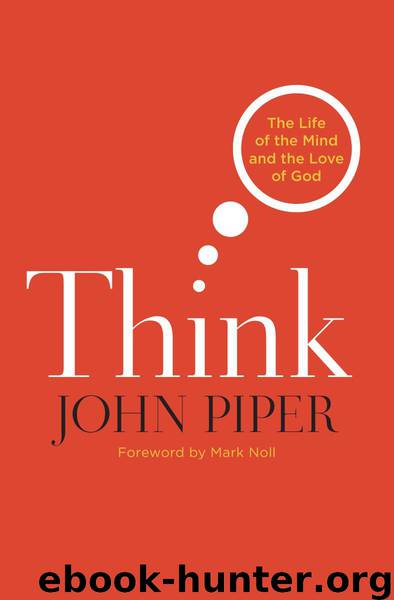Think: The Life of the Mind and the Love of God by John Piper & Mark A. Noll

Author:John Piper & Mark A. Noll
Language: eng
Format: mobi, epub
Tags: Religion
ISBN: 9781433520716
Publisher: Crossway
Published: 2010-09-14T22:00:00+00:00
9What I mean by rationalistic is suggested by the way G. K. Chesterton warns us: “The madman is
not the man who has lost his reason. The madman is the man who has lost everything except his
reason.” “The poet only asks to get his head into the heavens. It is the logician who seeks to get the heavens into his head. And it is his head that splits.” In other words, the poet is “rational” the way I am using the term—he is humble enough to freely delight in what heaven really has to reveal.
Orthodoxy (Garden City, NY: Image Books, 1959), 17–19.
Think.20716.i03.indd 116
7/26/10 12:22 PM
Facing the
Challenge of
Anti-intellectualism
Think.20716.i03.indd 117
7/26/10 12:22 PM
I do not undervalue education, but really I have seen
so many of these educated preachers who forcibly
reminded me of lettuce growing under the shade of a
peach tree, or like a gosling that had got the straddles
by wading in the dew, that I turn away sick and faint. . . .
Peter Cartwright
Think.20716.i03.indd 118
7/26/10 12:22 PM
9
Unhelpful Anti-intellectual
Impulses in Our History
Evangelist Billy Sunday, who died in 1935, spoke for many Christians
when he said, “If I had a million dollars I’d give $999,999 to the
church and $1 to education.”1 This might not be a bad idea if the
church took responsibility for education. But that’s not what he
meant. This is the voice of thousands who are deeply suspicious of
any emphasis on thinking in the pursuit of God—like the emphasis
of this book.
American Partners: Pragmatism and Subjectivism
The America that produced Billy Sunday was an America on its way
to the triumph of pragmatism and subjectivism. Not that Sunday
was unprincipled, but his hostility to the life of the mind diminished
the ability of the church to stand against destructive uses of the
mind—like pragmatism and subjectivism.
These two views have triumphed for many people in our cul-
ture—and in our churches.2 Subjectivism says that thinking is useful
1Quoted in Richard Hofstadter, Anti-Intellectualism in American Life (New York: Vintage, 1962), 122.
2One of the best books documenting this is David Wells, No Place for Truth, Or: Whatever Happened
to Evangelical Theology? (Grand Rapids: Eerdmans, 1993). “Many of those whose task it is to broker
the truth of God to the people of God in the churches have now redefined the pastoral task such that theology has become an embarrassing encumbrance or a matter of which they have little knowl-Think.20716.i03.indd 119
7/26/10 12:22 PM
120 Facing the Challenge of Anti-intellectualism
as a means of justifying subjective desires. Pragmatism says that
thinking is useful as a means of making things work. To be sure,
these forces can produce striking achievements in science and busi-
ness and industry. But missing from both views is the conviction
that thinking is a gift of God, whose chief role is to pursue and love
and live by ultimate truth.
Pragmatism and subjectivism obscure the reality of truth. They
engage the mind, but they make it the servant of our desires and
our work. But they can’t answer which desires I should pursue and
which work is worthwhile. On this point Nicholas Wolterstorff,
who taught philosophy at Calvin College for thirty years and at Yale
University for fifteen years, wrote in
Download
Think: The Life of the Mind and the Love of God by John Piper & Mark A. Noll.epub
This site does not store any files on its server. We only index and link to content provided by other sites. Please contact the content providers to delete copyright contents if any and email us, we'll remove relevant links or contents immediately.
The 5 Love Languages: The Secret to Love That Lasts by Gary Chapman(9792)
The Space Between by Michelle L. Teichman(6932)
Assassin’s Fate by Robin Hobb(6200)
Wiseguy by Nicholas Pileggi(5770)
Everything Happens for a Reason by Kate Bowler(4734)
Gerald's Game by Stephen King(4642)
Pillow Thoughts by Courtney Peppernell(4272)
A Simplified Life by Emily Ley(4158)
The Power of Positive Thinking by Norman Vincent Peale(4062)
Harry Potter and the Prisoner of Azkaban (Book 3) by J. K. Rowling(3355)
Resisting Happiness by Matthew Kelly(3337)
Girl, Wash Your Face by Rachel Hollis(3282)
Being Aware of Being Aware by Rupert Spira(3272)
The Secret Power of Speaking God's Word by Joyce Meyer(3184)
The Code Book by Simon Singh(3181)
More Language of Letting Go: 366 New Daily Meditations by Melody Beattie(3024)
Real Sex by Lauren F. Winner(3016)
Name Book, The: Over 10,000 Names--Their Meanings, Origins, and Spiritual Significance by Astoria Dorothy(2982)
The Holy Spirit by Billy Graham(2944)
